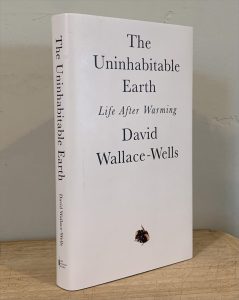Resuming my summary outline from yesterday’s post.
- Economic Collapse. Economic growth won’t save everything. The economic reign since the 18th century was perhaps simply from the discovery of fossil fuels—a one time, temporary, shift away from subsistence living. [[ This is an excellent perspective I had not considered before, especially the implication that it simply can’t last. ]] Climate change, of course, threatens economic growth, perhaps reducing it by 20% by 2100; perhaps 50%. It will be much, much more expensive *not* to act on climate change, than to take even the most aggressive action now.
- Climate Conflict. Climate changes can trigger conflicts, e.g. Syria’s civil war. The US military is obsessed climate change, for this reason, for the danger to military bases, and so on. Steven Pinker’s point that we don’t appreciate our world with less violence, reduced infant mortality, etc., is about the wealth brought about by fossil fuels. It can’t last. [[ Another, similar, excellent point. ]]
- “Systems.” These cascades of effects are called “systems crises” by climate scientists. Short of conflict, they produce increased migration—climate refugees—more disease, malnutrition. With resulting changes in family planning. To mental health. Depression. Suicide rates.
- These are the 12 “known knowns.” Identified from research just in the past decade or two. There are other categories.
Part III: The Climate Kaleidoscope
- Storytelling. Except in movies and TV shows, where the disasters are limited, our stories don’t take climate change very seriously. This will change. The science fiction books about the crisis mostly go unread. Amitav Ghosh. (He does mention other several “cli-fi” titles in the note, on page 281, for page 146: Wells, Ballard, Atwood, McEwan, McCarthy, and of course Robinson.) Stories usually require villains; who are villains here? Everyone. Maybe oil companies, and certain political parties, in particular. Bill McKibben warned us in 1989; by now scientists beware “alarmism” by reducing the urgency of the threat, and burning out when no one pays attention.
- Crisis Capitalism. Climate change triggers many of our cognitive biases—anchoring, ambiguity effect, etc., which overturn the supposedly rationalist approach to economics. Europe dominated due to fossil fuels, especially coal in England. Climate change could bring about a permanent recession, and increased inequality. Who will pay? Already there are court cases against oil companies, and against nations who have profited by burning fossil fuels.
- The Church of Technology. Technologists like to claim the problem has been solved, via various methods. (Ted Chiang quote, p172.) But the fantasies of technologists, about AI and posthumanity, don’t help here. We need new solutions, quickly; all systems must be remade, from planes to concrete. Nuclear power could help, but with power-plant disasters, despite incidental casualties, its reputation has gone south.
- Politics of Consumption. Protests against pollution haven’t accomplished much. The wealthiest nations pollute the most. GMOs are part of the solution; but there’s an impulse toward “purity” that is not helping things. The “unchecked wisdom of the market” has in fact unleashed climate change. New politics must replace it; a retreat to zero-sum politics, or perhaps a true world state. More likely climate change will reverse the course to a global order.
- History After Progress. The idea of progress, being on the “right side of history,” is being undone by climate change; recall Harari and others, how most of human history was about hunter-gatherers. Our modern “history” may be just a blip; our descendants may live in the ruins of today. Climate change is a revenge of time; the entire lifespan of human history will become incidental.
- Ethics at the end of the world. Examples of thoughts by Guy McPherson, a climatologist certain of doom. Other thinking echoes Revelation, though it was written as prophecies for what would happen in a single generation. Others: Jeffers, Abbey, Bukowski. Shades of nihilism are creeping into consensus wisdom, such as eco-fascism, a go-it-alone approach. Or a political revolution. Despair grows. And apathy. Richard Powers’ idea of “species loneliness.”
Part IV: The Anthropic Principle
- What if we’re wrong? The climate crisis is a wager on the validity of science itself. But what will happen is a bet on human activity.
- Our civilization is so fragile it has been undone in just one generation. But if we caused the problem, we should be able to fix it, if we want to.
- Recall Fermi in 1950, and UFOs. Where is everybody? Maybe the answer is climate. The lifespan of civilizations may be very short.
- The search for alien life is a kind of Copernican dream. We’ve discovered legions of planets like our own. Things may have happened millions of times before. Could there have been other industrial civilizations even on Earth? If so, apparently none of them have survived.
- The counterpoint is the anthropic principle. We could choose to be empowered. Think like a planet. Recall Oppenheimer.
- We have the tools we need to stop it. But the problem is still overwhelming.
- We’ve already thought about Gaia, spaceship earth, the pale blue dot. You can choose your metaphor. But there’s only one planet.
Key lessons (my conclusions):
- A catastrophe can be long and drawn out, so that most people don’t even notice – not like catastrophes in movies, which arrive and are over with in two hours.
- Climate change is still mostly spotty disasters that *happen to other people* and so can be dismissed by the majority of those unaffected.
- People put off, or ignore, dangers that won’t affect them immediately.
- People can’t even perceive dangers on timescales longer than their personal lifetimes.
- Many people now dismiss any kind of warning as phony, some kind of conspiracy theory, to interfere with their “freedom.”






